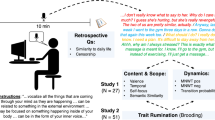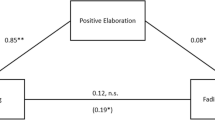Abstract
Objectives
Free-moving thoughts can have profound implications on how an individual interacts with the world, as well as their sense of self—sometimes maladaptively so. Previous research has suggested that mindfulness allows one to better detect the contents of the mind and thus prevent rumination on negative thoughts, but the association between mindfulness and free-moving thought dynamics is still unknown. In this study, we examined the relationship between trait mindfulness and free-moving thought dynamics.
Method
One hundred and twenty-three participants between 18 and 50 years old (M = 19.59, SD = 3.34 years) completed the Five Facet Mindfulness Questionnaire (FFMQ) and the free association semantic task (FAST), and rated the valence, arousal, and dominance of each generated word in the FAST. Zero–one inflated beta (ZOIB) regressions were used to analyze the relationship between trait mindfulness and thought transitions.
Results
Several components of the FFMQ predicted affective qualities of participants’ free-moving thoughts. Act-awareness and non-judgment significantly predicted the likelihood of transitioning from a low to high affective valence. Act-awareness, observing, and describing were also significant predictors of transitioning from a high to low affective valence. Finally, act-awareness was a significant predictor of switching from a high to low arousal state, while observing was a significant predictor of switching from high to low dominance.
Conclusions
Our study revealed that the use of the FAST could identify nuances in dynamics of free-moving thoughts and is associated with dimensions of trait mindfulness. Moreover, the use of ZOIB regression modeling demonstrates its feasibility for use with data bounded by values between 0 and 1.
Preregistration
This study is not preregistered.



Similar content being viewed by others
Data Availability
Raw data and code for the paper are available at the Open Science Framework (https://osf.io/8jt7q/).
References
Alleva, J., Roelofs, J., Voncken, M., Meevissen, Y., & Alberts, H. (2012). On the relation between mindfulness and depressive symptoms: Rumination as a possible mediator. Mindfulness, 5(1), 72–79. https://doi.org/10.1007/s12671-012-0153-y
Anālayo, B. (2018). The emphasis on the present moment in the cultivation of mindfulness. Mindfulness, 10(3), 571–581. https://doi.org/10.1007/s12671-018-1074-1
Anālayo, B. (2019). In the seen just the seen: Mindfulness and the construction of experience. Mindfulness, 10(1), 179–184. https://doi.org/10.1007/s12671-018-1042-9
Andrews-Hanna, J. R., Woo, C. W., Wilcox, R., Eisenbarth, H., Kim, B., Han, J., Losin, E. A. R., & Wager, T. D. (2022). The conceptual building blocks of everyday thought: Tracking the emergence and dynamics of ruminative and nonruminative thinking. Journal of Experimental Psychology: General, 151(3), 628–642. https://doi.org/10.1037/xge0001096
Baer, R. A., Smith, G. T., Hopkins, J., Krietemeyer, J., & Toney, L. (2006). Using self-report assessment methods to explore facets of mindfulness. Assessment, 13(1), 27–45. https://doi.org/10.1177/1073191105283504
Bernstein, A., & Zvielli, A. (2014). Attention Feedback Awareness and Control Training (A-FACT): Experimental test of a novel intervention paradigm targeting attentional bias. Behaviour Research and Therapy, 55, 18–26. https://doi.org/10.1016/j.brat.2014.01.003
Bernstein, A., Hadash, Y., & Fresco, D. M. (2019). Metacognitive processes model of decentering: Emerging methods and insights. Current Opinion in Psychology, 28, 245–251. https://doi.org/10.1016/j.copsyc.2019.01.019
Blanke, E. S., Schmidt, M. J., Riediger, M., & Brose, A. (2020). Thinking mindfully: How mindfulness relates to rumination and reflection in daily life. Emotion, 20(8), 1369–1381. https://doi.org/10.1037/emo0000659
Brown, K. W., & Ryan, R. M. (2003). The benefits of being present: Mindfulness and its role in psychological well-being. Journal of Personality and Social Psychology, 84(4), 822–848. https://doi.org/10.1037/0022-3514.84.4.822
Buswell, R. E., & Lopez, D. S. (2014). The Princeton Dictionary of Buddhism. Princeton University Press.
Carpenter, J. K., Conroy, K., Gomez, A. F., Curren, L. C., & Hofmann, S. G. (2019). The relationship between trait mindfulness and affective symptoms: A meta-analysis of the Five Facet Mindfulness Questionnaire (FFMQ). Clinical Psychology Review, 74, 101785. https://doi.org/10.1016/j.cpr.2019.101785
Chiarella, S. G., Makwana, M., Simione, L., Hartkamp, M., Calabrese, L., Raffone, A., & Srinivasan, N. (2020). Mindfulness meditation weakens attachment to self: Evidence from a self vs other binding task. Mindfulness, 11(10), 2411–2422. https://doi.org/10.1007/s12671-020-01457-9
Christoff, K., Irving, Z. C., Fox, K. C., Spreng, R. N., & Andrews-Hanna, J. R. (2016). Mind-wandering as spontaneous thought: A dynamic framework. Nature Reviews Neuroscience, 17(11), 718–731. https://doi.org/10.1038/nrn.2016.113
Collins, S. E., Chawla, N., Hsu, S. H., Grow, J., Otto, J. M., & Marlatt, G. A. (2009). Language-based measures of mindfulness: Initial validity and clinical utility. Psychology of Addictive Behaviors, 23(4), 743–749. https://doi.org/10.1037/a0017579
Constantinou, E., Van Den Houte, M., Bogaerts, K., Van Diest, I., & Van den Bergh, O. (2014). Can words heal? Using affect labeling to reduce the effects of unpleasant cues on symptom reporting. Frontiers in Psychology, 5, 807. https://doi.org/10.3389/fpsyg.2014.00807
Dahl, C. J., Lutz, A., & Davidson, R. J. (2015). Reconstructing and deconstructing the self: Cognitive mechanisms in meditation practice. Trends in Cognitive Sciences, 19(9), 515–523. https://doi.org/10.1016/j.tics.2015.07.001
DeMarree, K. G., & Naragon-Gainey, K. (2022). Individual differences in the contents and form of present-moment awareness: The multidimensional awareness scale. Assessment, 29(3), 583–602. https://doi.org/10.1177/1073191120986605
Dunne, J. D., Thompson, E., & Schooler, J. (2019). Mindful meta-awareness: Sustained and non-propositional. Current Opinion in Psychology, 28, 307–311. https://doi.org/10.1016/j.copsyc.2019.07.003
Ekman, R., Fletcher, A., Giota, J., Eriksson, A., Thomas, B., & Bååthe, F. (2021). A flourishing brain in the 21st century: A scoping review of the impact of developing good habits for mind, brain, well-being, and learning. Mind, Brain, and Education, 16(1), 13–23. https://doi.org/10.1111/mbe.12305
Fan, R., Varol, O., Varamesh, A., Barron, A., van de Leemput, I. A., Scheffer, M., & Bollen, J. (2019). The minute-scale dynamics of online emotions reveal the effects of affect labeling. Nature Human Behavior, 3(1), 92–100. https://doi.org/10.1038/s41562-018-0490-5
Franquesa, A., Cebolla, A., García-Campayo, J., Demarzo, M., Elices, M., Pascual, J. C., & Soler, J. (2017). Meditation practice is associated with a values-oriented life: The mediating role of decentering and mindfulness. Mindfulness, 8(5), 1259–1268. https://doi.org/10.1007/s12671-017-0702-5
Fuochi, G., & Voci, A. (2020). The de-automatizing function of mindfulness facets: An empirical test. Mindfulness, 11(4), 940–952. https://doi.org/10.1007/s12671-020-01305-w
Galante, J., Grabovac, A., Wright, M., Ingram, D. M., Van Dam, N. T., Sanguinetti, J. L., Sparby, T., van Lutterveld, R., & Sacchet, M. D. (2023). A framework for the empirical investigation of mindfulness meditative development. Mindfulness, 14(5), 1054–1067. https://doi.org/10.1007/s12671-023-02113-8
Garland, E. L., Hanley, A., Farb, N. A., & Froeliger, B. E. (2015). State mindfulness during meditation predicts enhanced cognitive reappraisal. Mindfulness, 6(2), 234–242. https://doi.org/10.1007/s12671-013-0250-6
Grabovac, A. (2014). The stages of insight: Clinical relevance for mindfulness-based interventions. Mindfulness, 6(3), 589–600. https://doi.org/10.1007/s12671-014-0294-2
Grabovac, A. D., Lau, M. A., & Willett, B. R. (2011). Mechanisms of mindfulness: A Buddhist psychological model. Mindfulness, 2(3), 154–166. https://doi.org/10.1007/s12671-011-0054-5
Gray, K., Anderson, S., Chen, E. E., Kelly, J. M., Christian, M. S., Patrick, J., Huang, L., Kenett, Y. N., & Lewis, K. (2019). “Forward flow”: A new measure to quantify free thought and predict creativity. American Psychologist, 74(5), 539–554. https://doi.org/10.1037/amp0000391
Hadash, Y., Plonsker, R., Vago, D. R., & Bernstein, A. (2016). Experiential self-referential and selfless processing in mindfulness and mental health: Conceptual model and implicit measurement methodology. Psychological Assessment, 28(7), 856–869. https://doi.org/10.1037/pas0000300
Hanley, A. W., & Garland, E. L. (2019). Mindfulness training disrupts Pavlovian conditioning. Physiology & Behavior, 204, 151–154. https://doi.org/10.1016/j.physbeh.2019.02.028
Harp, N. R., Freeman, J. B., & Neta, M. (2022). Mindfulness-based stress reduction triggers a long-term shift toward more positive appraisals of emotional ambiguity. Journal of Experimental Psychology: General, 151(9), 2160–2172. https://doi.org/10.1037/xge0001173
Hoemann, K., Nielson, C., Yuen, A., Gurera, J. W., Quigley, K. S., & Barrett, L. F. (2021). Expertise in emotion: A scoping review and unifying framework for individual differences in the mental representation of emotional experience. Psychological Bulletin, 147(11), 1159–1183. https://doi.org/10.1037/bul0000327
Iani, L., Lauriola, M., Chiesa, A., & Cafaro, V. (2018). Associations between mindfulness and emotion regulation: The key role of describing and nonreactivity. Mindfulness, 10(2), 366–375. https://doi.org/10.1007/s12671-018-0981-5
Ibaceta, M., & Madrid, H. P. (2021). Personality and mind-wandering self-perception: The role of meta-awareness. Frontiers in Psychology, 12, 581129. https://doi.org/10.3389/fpsyg.2021.581129
Keng, S.-L., Tong, E. M. W., Yan, E. T. L., Ebstein, R. P., & Lai, P.-S. (2021). Effects of mindfulness-based stress reduction on affect dynamics: A randomized controlled trial. Mindfulness, 12(6), 1490–1501. https://doi.org/10.1007/s12671-021-01617-5
Kiken, L. G., & Shook, N. J. (2011). Looking up: Mindfulness increases positive judgments and reduces negativity bias. Social Psychological and Personality Science, 2(4), 425–431. https://doi.org/10.1177/1948550610396585
Lee, K. C., & Tang, J. L. K. (2023). Note, know, choose: A psychospiritual treatment model based on early Buddhist teachings. Spirituality in Clinical Practice, 10(2), 150–167. https://doi.org/10.1037/scp0000220
Levenson, R. W. (1999). The intrapersonal functions of emotion. Cognition and Emotion, 13(5), 481–504. https://doi.org/10.1080/026999399379159
Lin, Y., Callahan, C. P., & Moser, J. S. (2018). A mind full of self: Self-referential processing as a mechanism underlying the therapeutic effects of mindfulness training on internalizing disorders. Neuroscience and Biobehavioral Reviews, 92, 172–186. https://doi.org/10.1016/j.neubiorev.2018.06.007
Liu, F., & Eugenio, E. C. (2018). A review and comparison of Bayesian and likelihood-based inferences in beta regression and zero-or-one-inflated beta regression. Statistical Methods in Medical Research, 27(4), 1024–1044. https://doi.org/10.1177/0962280216650699
Lutz, A., Jha, A. P., Dunne, J. D., & Saron, C. D. (2015). Investigating the phenomenological matrix of mindfulness-related practices from a neurocognitive perspective. American Psychologist, 70(7), 632–658. https://doi.org/10.1037/a0039585
Mildner, J. N., & Tamir, D. I. (2019). Spontaneous thought as an unconstrained memory process. Trends in Neurosciences, 42(11), 763–777. https://doi.org/10.1016/j.tins.2019.09.001
Mills, C., Raffaelli, Q., Irving, Z. C., Stan, D., & Christoff, K. (2018). Is an off-task mind a freely-moving mind? Examining the relationship between different dimensions of thought. Consciousness and Cognition, 58, 20–33. https://doi.org/10.1016/j.concog.2017.10.003
Naragon-Gainey, K., & DeMarree, K. G. (2017). Structure and validity of measures of decentering and defusion. Psychological Assessment, 29(7), 935–954. https://doi.org/10.1037/pas0000405
Nes, L. S., Segerstrom, S. C., & Sephton, S. E. (2005). Engagement and arousal: Optimism’s effects during a brief stressor. Personality and Social Psychology Bulletin, 31(1), 111–120. https://doi.org/10.1177/0146167204271319
Pennebaker, J. W. (1997). Writing about emotional experiences as a therapeutic process. Psychological Science, 8(3), 162–166. https://doi.org/10.1111/j.1467-9280.1997.tb00403.x
Pennebaker, J. W. (2018). Expressive writing in psychological science. Perspectives on Psychological Science, 13(2), 226–229. https://doi.org/10.1177/1745691617707315
Pennebaker, J. W., & Chung, C. K. (2012). Expressive writing: Connections to physical and mental health. In H. S. Friedman (Ed.), The Oxford Handbook of Health Psychology (pp. 417–437). Oxford University Press. https://doi.org/10.1093/oxfordhb/9780195342819.013.0018
Pennebaker, J. W., Boot, R. J., Boyd, R. L., & Francis, M. E. (2015). Linguistic Inquiry and Word Count: LIWC2015. Pennebaker Conglomerates.
Pollatos, O., Herbert, B. M., Matthias, E., & Schandry, R. (2007). Heart rate response after emotional picture presentation is modulated by interoceptive awareness. International Journal of Psychophysiology, 63(1), 117–124. https://doi.org/10.1016/j.ijpsycho.2006.09.003
Przyrembel, M., & Singer, T. (2018). Experiencing meditation - Evidence for differential effects of three contemplative mental practices in micro-phenomenological interviews. Consciousness and Cognition, 62, 82–101. https://doi.org/10.1016/j.concog.2018.04.004
Raphiphatthana, B., Jose, P., & Salmon, K. (2018). Does dispositional mindfulness predict the development of grit? Journal of Individual Differences, 39(2), 76–87. https://doi.org/10.1027/1614-0001/a000252
Rowland, Z., Wenzel, M., & Kubiak, T. (2020). A mind full of happiness: How mindfulness shapes affect dynamics in daily life. Emotion, 20(3), 436–451. https://doi.org/10.1037/emo0000562
Ruimi, L., Hadash, Y., Zvielli, A., Amir, I., Goldstein, P., & Bernstein, A. (2018). Meta-awareness of dysregulated emotional attention. Clinical Psychological Science, 6(5), 658–670. https://doi.org/10.1177/2167702618776948
Shi, Z., & He, L. (2019). Mindfulness: Attenuating self-referential processing and strengthening other-referential processing. Mindfulness, 11(3), 599–605. https://doi.org/10.1007/s12671-019-01271-y
Skoranski, A., Coatsworth, J. D., & Lunkenheimer, E. (2019). A dynamic systems approach to understanding mindfulness in interpersonal relationships. Journal of Child and Family Studies, 28(10), 2659–2672. https://doi.org/10.1007/s10826-019-01500-x
Stasinopoulos, D. M., & Rigby, R. A. (2007). Generalized additive models for location scale and shape (GAMLSS) in R. Journal of Statistical Software, 23(7), 1–46. https://doi.org/10.18637/jss.v023.i07
Tabachnick, B. G., & Fidell, L. S. (2007). Using Multivariate Statistics (6th ed ed.). Pearson Education.
Tausczik, Y. R., & Pennebaker, J. W. (2009). The psychological meaning of words: LIWC and computerized text analysis methods. Journal of Language and Social Psychology, 29(1), 24–54. https://doi.org/10.1177/0261927x09351676
Valdez, C. E., Sherrill, A. M., & Lilly, M. (2016). Present moment contact and nonjudgment: Pilot data on dismantling mindful awareness in trauma-related symptomatology. Journal of Psychopathology and Behavioral Assessment, 38(4), 572–581. https://doi.org/10.1007/s10862-016-9548-8
Warriner, A. B., Kuperman, V., & Brysbaert, M. (2013). Norms of valence, arousal, and dominance for 13,915 English lemmas. Behavior Research Methods, 45(4), 1191–1207. https://doi.org/10.3758/s13428-012-0314-x
Wickham, H. (2016). Ggplot2: Elegant graphics for data analysis. Springer.
Wielgosz, J., Goldberg, S. B., Kral, T. R. A., Dunne, J. D., & Davidson, R. J. (2018). Mindfulness meditation and psychopathology. Annual Review of Clinical Psychology, 7(15), 285–316. https://doi.org/10.1146/annurev-clinpsy-021815-093423
Wright, M. J., Sanguinetti, J. L., Young, S., & Sacchet, M. D. (2023). Uniting contemplative theory and scientific investigation: Toward a comprehensive model of the mind. Mindfulness, 14(5), 1088–1101. https://doi.org/10.1007/s12671-023-02101-y
Xu, M., Purdon, C., Seli, P., & Smilek, D. (2017). Mindfulness and mind wandering: The protective effects of brief meditation in anxious individuals. Consciousness and Cognition, 51, 157–165. https://doi.org/10.1016/j.concog.2017.03.009
Zvielli, A., Amir, I., Goldstein, P., & Bernstein, A. (2015). Targeting biased emotional attention to threat as a dynamic process in time. Clinical Psychological Science, 4(2), 287–298. https://doi.org/10.1177/2167702615588048
Acknowledgements
We thank Guangsheng Liang and Juliana Oyegunle for collecting the data for this study.
Author information
Authors and Affiliations
Contributions
WFZY: conceptualization, methodology, data collection, data analysis, writing — original draft preparation.
MS: conceptualization, methodology, writing — reviewing and editing.
Corresponding author
Ethics declarations
Ethics Approval
This study was approved by the Institutional Research Board of Texas Tech University. All participants provided written informed consent prior to enrolment in the study.
Informed Consent
Participants gave written informed consent prior to the start of the study.
Conflict of Interest
The authors declare no competing interests.
Additional information
Publisher's Note
Springer Nature remains neutral with regard to jurisdictional claims in published maps and institutional affiliations.
Winson Fu Zun Yang is currently affiliated with the Meditation Research Program, Department of Psychiatry at Massachusetts General Hospital, Harvard Medical School, in Boston.
Supplementary Information
Below is the link to the electronic supplementary material.
Rights and permissions
Springer Nature or its licensor (e.g. a society or other partner) holds exclusive rights to this article under a publishing agreement with the author(s) or other rightsholder(s); author self-archiving of the accepted manuscript version of this article is solely governed by the terms of such publishing agreement and applicable law.
About this article
Cite this article
Yang, W.F.Z., Scolari, M. Trait Mindfulness is Associated with Dynamic Affective Qualities of Free-Moving Thought. Mindfulness 14, 2780–2794 (2023). https://doi.org/10.1007/s12671-023-02235-z
Accepted:
Published:
Issue Date:
DOI: https://doi.org/10.1007/s12671-023-02235-z




